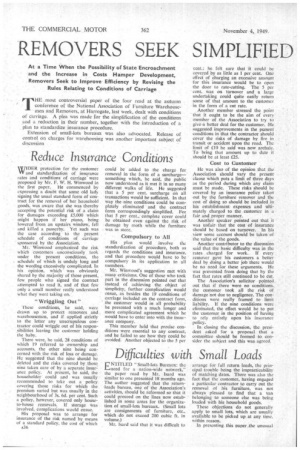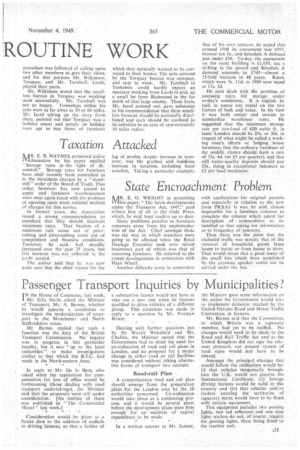REMOVERS SEEK SIMPLIFIED ROUTINE WORK
Page 54

Page 55

If you've noticed an error in this article please click here to report it so we can fix it.
At a Time When the Possibility of State Encroachment and the Increase in Costs Hamper Pevelopment, Removers Seek to Improve Efficiency by Revising the Rules Relating to Conditions of Carriage HE most controversial paper of the four read at the autumn conference of the National Association of Furniture Warehouse men and Removers, at Harrogate, last week, dealt with conditions of Carriage. A plea was made for the simplification of the conditions and a reduction in their number, together with the introduction of a . plan to standardize insurance procedure.
Extension of small-lots bureaux was also advocated. Release of conttol on charges for warehousing was another important subject of discussion
Reduce Insurance Conditions
IVIDER protection for the customer VV and standardization of insurance rates and conditions of carriage were proposed by Mr. F. W. H. Winwood in the first paper. He commenced by expressing a doubt that some old lady signing the usual standard form of contract for the removal of her household goods, was aware that she was thereby accepting the potential risk of a claim for damages exceeding £5,000 which might happen if her piano, being lowered from an upstairs window, fell and killed a passerby. Yet such was the case according to the present schedule of conditions of carriage sponsored by the Association.
Mr. Winwood emphasized the risk which customers unconsciously took under the present conditions, the schedule of which is unduly long and the wording excessively complicated. In his opinion, which was obviously shared by the majority of those present, few people who signed the contract attempted to read it, and of that few only a small number really understood what they were taking on.
"Wriggling Out"
• These conditions, he said, were drawn up to protect removers and warehousemen, and if applied strictly to the letter any unscrupulous contractor could wriggle out of his responsibilities leaving the customer holding the baby.
There were, he said, 28 conditions of which 19 referred to ownership and accounts, the other nine being concerned with the risk of loss or damage. He suggested that the nine should be deleted and the risks covered by those nine taken care of by a separate insurance policy. At present, he said, the householder could and was usually recommended to take out a policy covering those risks for which the premium varied but was usually in the neighbourhood of 3s, 6d. per cent. Such a policy, however, covered only houseto-house removals. If storage was involved, complications would ensue.
His proposal was to arrange for insurance of the risk named by means of a standard policy, the cost of which A36
could be added to the charge for removal in the form of a surcharge— something which, he said, the public now understood as it met it in so many different walks of life. He suggested that a 5 per cent. surcharge on all transactions would be sufficient. In that way the nine conditions could be completely eliminated and the contract form correspondingly simplified. For that 5 per cent.; complete cover could be obtained even against the risk of
• damage by moth while the furniture was in store.
Compulsory to All
His plan would involve the standardization of procedure, both as regards the conditions and insurance, and that procedure would have to be compulsory in its application to all members.
Mr. Winwood's suggestion met with many criticisms. One of those who took part in the discussion pointed outthat instead of achieving the object of simplicity, further complication would ensue, as besides the 19 conditions of carriage included on the contract form, the customer would in all probability be presented with a much longer and more complicated agreement which he would have to enter into with the instilance company.
This member held -that precise conditions were essential to any contract, and he failed to see how they could be avoidedAnother objected to the 5 per cent.: he felt sure that it could be covered by as little as I per cent. One effect of charging an excessive amount for this insurance would be to open the door to rate-cutting. The 5 per cent, was on turnover and a large undertaking could quite easily return some of that amount to the customer in the form of a cut rate.
Another member stressed the point that it ought to be the aim of every member of the Association to try to give -a better deal for the customer. He suggested improvements in the peesent conditions in that the contractor should cover the risks of damage by lire in transit or accident upon the road. The limit of £10 he said was now archaic. To bring that amount up to date it should be at least £25.
Cost to Customer
He was also of the opinion that the Association should vary the present clause which puts a limit of three days as the period during which any claim must be made. These risks should be covered by an insurance policy taken out by the furniture remover and the cost of doing so should be included in his establishment expenses and ultimately charged to the customer in a fair and proper manner.
Another speaker pointed out that it was unfair that the cost of insurance should be based on turnover. In his view some account should be taken of the value of the goods.
Another contributor to the discussion said that the basic difficulty was in the rates charged for work. If every , remover gave his customers a betterdeal by doing a better job there would be no need for these arguments. He was prevented from doing that by the fact that rates still continued to be cut.
The Association's solicitor pointed out that if there were no condition's. the customer took all the risk of damage not due to negligence. The con ditions were really framed to limit liability. If the nine conditions were . eliminated, the effect would be to put the *customer in the position of having to rely entirely upon his insurance policy. In closing the discussion, the president asked for a proposal that a committee should be formed to consider the subject and this was agreed.




















































































